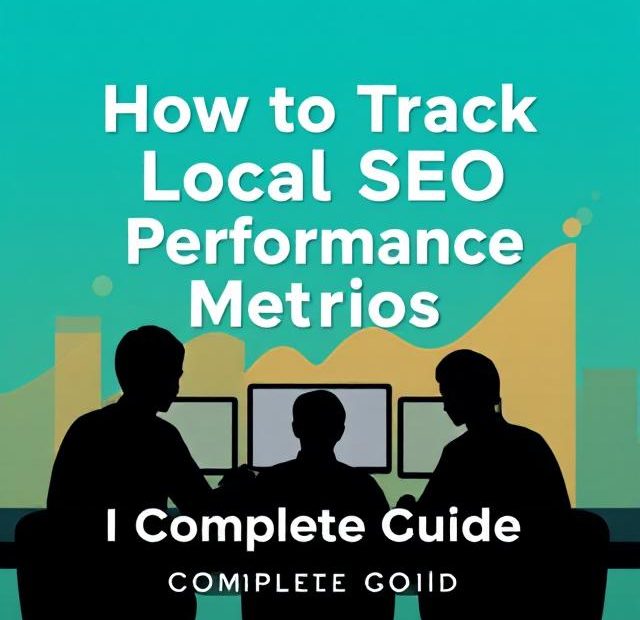If you’re investing time and resources into local SEO, you need to know whether your efforts are paying off. Are your Google rankings improving? Are more local customers visiting your website or calling your business? These questions can only be answered if you’re tracking the right local SEO performance metrics.
In this guide, we’ll walk through the key metrics that matter most in local SEO, the tools you should be using, and how to interpret the data to make informed decisions.
Why Tracking Local SEO Metrics Matters
Local SEO is different from general SEO. It focuses on targeting customers in a specific area and involves ranking in local map packs, optimizing Google Business Profiles, and building local citations.
Tracking the right metrics helps you:
-
Understand what’s working
-
Justify your SEO investment
-
Identify areas for improvement
-
Stay ahead of local competitors
Without data, you’re flying blind.
Essential Local SEO Metrics to Track
Let’s break down the most important metrics you should monitor to measure your local SEO performance.
1. Google Business Profile (GBP) Insights
Your Google Business Profile (formerly Google My Business) is a core component of local SEO. It’s often the first thing users see in local search results.
Key GBP metrics to track:
-
Search Queries: What terms people used to find your business
-
Views: How many times your profile appeared in search or on Google Maps
-
Actions:
-
Website visits
-
Phone calls
-
Direction requests
-
-
Photo Views: How often your business photos are viewed
Tip: Monitor changes before and after making optimizations (e.g., adding posts, updating hours, getting new reviews).
2. Local Pack Rankings
The “local pack” is the group of 3 map-based listings that appear at the top of local search results. Ranking here can significantly increase visibility and clicks.
To track local pack performance:
-
Use tools like BrightLocal, Whitespark, Local Falcon, or Moz Local.
-
Check your rankings for keywords like “best [service] near me” or “[service] in [city]”.
Bonus Tip: Track from multiple zip codes to see how you perform across different parts of your service area.
3. Organic Rankings for Local Keywords
Beyond the map pack, you should also track your organic rankings for local-intent keywords (e.g., “emergency plumber Boston”).
Use tools like:
-
Semrush
-
Ahrefs
-
Google Search Console
-
Ubersuggest
Set up keyword tracking campaigns that focus on local modifiers (city, zip code, neighborhood names).
4. Website Traffic from Local Sources
You’ll want to track how much traffic your website is getting from local searchers.
In Google Analytics 4 (GA4), segment by:
-
Location: See where your visitors are coming from geographically
-
Source/Medium: Look for traffic from “organic” and “google / organic”
-
Landing Pages: Check which location pages or service pages are most visited
Look for increases in sessions from local areas that you’re targeting.
5. Click-Through Rate (CTR)
Your CTR in search results tells you how compelling your listings are. A low CTR might mean your title tags or meta descriptions need improvement.
To track CTR:
-
Use Google Search Console
-
Focus on impressions vs. clicks
-
Monitor by page and by query
Local-intent queries with high impressions and low CTR indicate an opportunity to optimize content and metadata.
6. Online Reviews and Ratings
Online reviews directly influence your local SEO. Google uses review quantity, quality, and recency as ranking signals.
Track:
-
Average star rating
-
Number of new reviews
-
Review response rate
-
Mentions of keywords in reviews
Use tools like:
-
Google Business Profile dashboard
-
Reputation management tools (e.g., Podium, Birdeye, Grade.us)
Responding to reviews also signals engagement to Google and builds customer trust.
7. Local Citations and Directory Listings
Citations are mentions of your business’s name, address, and phone number (NAP) on local directories and websites. Consistency here is key.
Track:
-
Total number of citations
-
NAP consistency
-
Domain authority of directories
-
Duplicate listings or errors
Use tools like:
-
Moz Local
-
BrightLocal Citation Tracker
-
Whitespark
Fix inconsistent citations to avoid confusing Google and hurting your local rankings.
8. Conversions from Local Traffic
Traffic is great — but conversions are better. Whether it’s calls, form submissions, bookings, or sales, you need to track the actual business impact.
Set up conversion tracking in:
-
GA4 (with Events and Conversions)
-
Google Tag Manager
-
Call tracking platforms (e.g., CallRail, WhatConverts)
Make sure you can attribute conversions back to local traffic sources.
Bonus Tip: Track Competitor Performance
Use tools like Semrush, BrightLocal, or Local Falcon to monitor how your competitors are ranking for the same keywords. This helps you identify gaps and uncover local SEO opportunities.
Putting It All Together: Reporting and Analysis
Create a monthly or quarterly dashboard to track these metrics. You can use:
-
Google Looker Studio (formerly Data Studio)
-
BrightLocal Reports
-
Custom Excel or Google Sheets dashboards
Your report should highlight:
-
Changes in rankings
-
Growth in traffic and visibility
-
New reviews and ratings
-
Conversions and ROI
Use this data to refine your strategy, update underperforming pages, and double down on tactics that are working.
Conclusion
Tracking local SEO performance metrics isn’t just about numbers — it’s about understanding how your business is performing in the local search landscape and making smart decisions to improve it.
From Google Business Profile insights to conversion tracking and review management, every data point tells a story. Learn to read that story, and you’ll gain the edge over your local competitors.
Need help tracking your local SEO performance? Let us know — we offer customized local SEO audits and monthly reporting services to keep your business growing. Also, you can learn more about Schema Markup here.
